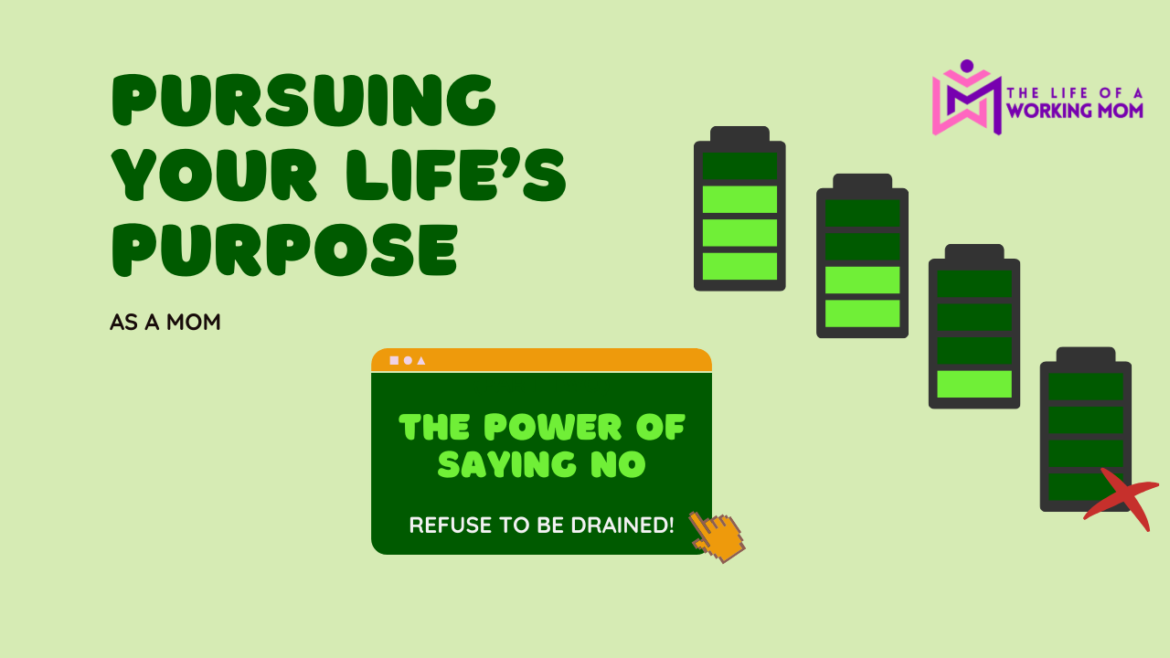Part 2: The Art of Saying No, Refuse to be Drained!
Let me ask you one important question?…
Have you ever found yourself saying “yes” to something, only to regret it later? Maybe it was an employment contract letter, a social obligation, or a favor you felt pressured to do.
Regardless of the situation, the outcome is often the same — you end up feeling drained, overwhelmed, and frustrated. The truth is, constantly saying yes to everything that does not align with your purpose can leave you with little time or energy for the things that truly matter to you and bring you the deep fulfillment of pursuing your life’s purpose.
What if there was a way to protect your time, energy, and well-being without feeling guilty?
What if you could confidently say no and refuse to be drained by other people’s demands?
In this article, we’re going to explore the art of saying no with confidence and how mastering this skill can help you take control of your life and reclaim your personal power.
1. Understanding the Power of No
Saying no is never a weakness as the world would want us to see it. Others also view saying no as a negative act, a rejection, or even a failure.
But the reality is that saying no is one of the most empowering tools at your disposal. Some people feel obliged to say yes to everything which leaves them open to being stretched too thin — mentally, physically, and emotionally.
By saying no, you set boundaries that protect your time and energy. It’s an act of self-respect, an acknowledgment that you deserve to focus on your matters that align with your path to serving your life’s purpose.
Think about it this way: each time you say yes to something that doesn’t serve you, you’re unintentionally saying no to your own needs and desires.
Example: Imagine you’re constantly taking on extra work because you don’t want to disappoint anyone. Over time, this leaves you with little time for rest, hobbies, or even your loved ones.
Personally, I would rather not say yes, so I can be present you are for the things that matter most. By learning to say no, you prevent burnout and ensure that your time is spent on activities that bring you joy and fulfillment.
2. Reframing the Way You View No
One of the biggest hurdles to saying no is the fear of disappointing others. We often worry about being perceived as rude, unkind, or selfish. However, the key to confidently saying no is reframing how you view it.
Saying no isn’t about rejecting the person; it’s about prioritizing your own needs. By saying no, you’re making space for things that truly matter to you, whether that’s personal time, growth, or pursuing your passions. It’s a powerful act of self-care, not selfishness.
Shift Your Perspective: Instead of seeing no as a refusal, think of it as an invitation to say yes to something more meaningful. For instance, saying no to a last-minute social event could be your way of saying yes to a quiet evening of self-care or spending quality time with your family.
When you learn to view saying no as a positive choice, it becomes easier to do. You’ll start to recognize that by refusing requests that drain you, you’re saying yes to your health, happiness, and well-being.
3. Building Your Confidence to Say No
Saying no can feel uncomfortable at first, especially if you’re used to saying yes to avoid conflict or to please others. But, just like any skill, saying no with confidence is something that can be learned and strengthened over time.
Trust Yourself: The first step to confidently saying no is learning to trust your instincts. When you’re asked to do something, take a moment to tune into your feelings. Does the request align with your values? Is it something you want to do, or do you feel obligated? Trusting your gut is essential in making decisions that serve you.
Start Small: If saying no feels intimidating, start with smaller, low-pressure situations. It could be as simple as declining an invitation to a gathering you’re not interested in, or saying no to a request for help that you don’t have the time or energy for. Each small “no” will help build your confidence for the bigger decisions.
Reaffirm Your Decision: Once you’ve made the choice to say no, affirm to yourself that it’s okay. Reassure yourself that saying no isn’t about being rude, it’s about protecting your time and energy. The more you practice, the more natural it will feel.
4. Practical Strategies for Saying No
Now that you understand the power of saying no and have started building your confidence, it’s time to focus on the how — the practical strategies for saying no in a way that feels respectful and clear.
Here are some ways to say no without feeling guilty:
- The Simple No: Sometimes, the most effective way to say no is to keep it short and straightforward. For example, simply saying “No, thank you,” or “I can’t commit to this right now,” gets the point across without the need for long explanations.
- The Polite No: If you want to soften the response, consider saying something like, “I appreciate the offer, but I’m unable to take this on.” This shows gratitude but maintains firm boundaries.
- The Honest No: If the situation allows, being open and honest can make saying no feel more authentic. For example, “I have a lot on my plate right now, and I need to focus on my personal commitments,” is a respectful and clear way to decline.
Remember, you don’t have to over-explain. Keep it brief and respectful, and trust that the person will understand.
5. Navigating Social and Professional Pressures
The pressure to say yes can be particularly strong when it comes to social and professional situations. Whether it’s attending a social gathering you don’t want to go to or taking on more work than you can handle, the fear of letting people down can make saying no feel incredibly difficult.
Social Pressures: It’s easy to feel like you have to say yes to every social invitation in order to maintain friendships or avoid disappointing people. But the truth is, true friends will understand if you need to decline. Saying no doesn’t make you a bad friend; in fact, it can make you a better one because you’re respecting your own limits and making time for the relationships that matter most.
Work Pressures: In a professional setting, the pressure to take on additional work or volunteer for projects can also be overwhelming. If you’re constantly saying yes to everything at work, you may be overloading yourself and sacrificing your own well-being. It’s crucial to recognize when you’re being asked to take on too much and learn to set professional boundaries.
You don’t have to accept every invitation or extra task that comes your way. Saying no is a sign of self-awareness and professional maturity.
6. Setting Clear and Firm Boundaries
The key to saying no with confidence lies in having clear boundaries. When you define what’s acceptable and what’s not, you can easily identify when something is outside of your limits.
Identify Your Priorities: Start by reflecting on what truly matters to you. What are your goals? What activities and relationships bring you joy and fulfillment? By defining your priorities, you’ll know when it’s necessary to say no to things that don’t align with your values.
Be Consistent: Consistency is key when it comes to enforcing boundaries. If you say no once, follow through. It might feel uncomfortable at first, but the more you practice setting boundaries, the more natural it becomes.
7. The Long-Term Benefits of Saying No
Mastering the art of saying no isn’t just about protecting yourself in the moment. Over time, consistently saying no to things that drain you can lead to profound changes in your life.
- More Energy: When you say no to commitments that don’t align with your priorities, you free up time and energy for the things that truly matter.
- Reduced Stress: Saying no helps you avoid feeling overwhelmed and overextended, which can significantly reduce stress levels.
- Increased Fulfillment: By saying no to the wrong things, you create space for the right things — the activities and relationships that align with your purpose and bring you genuine happiness.
Conclusion: Refuse to Be Drained!
The art of saying no with confidence is not just a skill, it’s a practice of self-love. By learning to say no, you refuse to let others drain your time, energy, and happiness. Instead, you take control of your life, setting boundaries that protect your well-being and allow you to focus on your life goals.
Start small. Practice often. And remember, every time you say no, you’re saying yes to a life that’s more fulfilling, less stressful, and aligned with your true priorities.
So, the next time you feel overwhelmed by someone’s request, take a deep breath and remember: You have the power to say no. Refuse to be drained!
You can follow us on social media @the life of a working mom.


